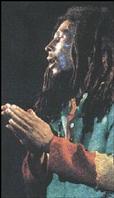|
Bob Marley's Songs:The Most Powerful and Popular song Lyrics !
Bob Marley's Songs
Some of Bob Marley’s Most Powerful and Popular Songs
"My music will go on forever. Maybe it's a fool say that, but when me know facts me can say facts. My music will go on forever." Bob Marley
Capturing the lyrical essence of the Third World’s first and maybe last superstar of this magnitude, seems elusive. However even with a sampling of Bob Marley hit songs it is still evident that Marley deserves the respect of all for churning out such timeless, inspiring and revolutionary material. Many critics of Marley have failed to realize that he was a man who read widely, was deeply interested and knowledgeable in African and World history, acknowledged and appreciated the teachings of great Black prophets and leaders such as Malcolm X, Marcus Garvey, Walter Rodney and Haile Selassie. He lived in a time when the black man was still fighting for a place in society. Hence his lyrics call for deeper examination of human relations moving beyond the captivating rhythms and melodious harmonies.
Bob Marley's approach to music and song writing was more serious than many observers have realized. Songs such as “One Love, Stir It Up and Three Little Birds” cast Marley in the role of lover boy/ feel good artist. Bob Marley was indeed a lover but he was also an avid fighter for the rights of the down trodden. The soci-political environment of Trench Town in Kingston Jamaica had a profound impact on the reggae legend. Bob Marley’s music reveals a certain level of consistency as it relates to the themes and images he uses to portray his messages and social commentary.
There seemed to be a disconnect between the Marley that spoke only the native tongue associated with the poor and uneducated (patois) in Bob Marley interviews (local and international) and the Marley that spoke so eloquently with his use of metaphors and symbolism in his songs. This feeling of disconnect further intensified after Bob Marley conversion to Rastafarianism, which on the surface strikes the general public as according to Kwame Dawes in Bob Marley: Lyrical Genius, “a rather fanciful belief system”. With this new sense of self and mysticism Marley began to utilize proverbs and Rastafarian philosophy extensively, showing a drastic contrast and growth on the evolutionary and revolutionary course from a young dreamy ghetto boy in the Wailing Wailers to a solo artist at Island/Tuff Gong.
|



